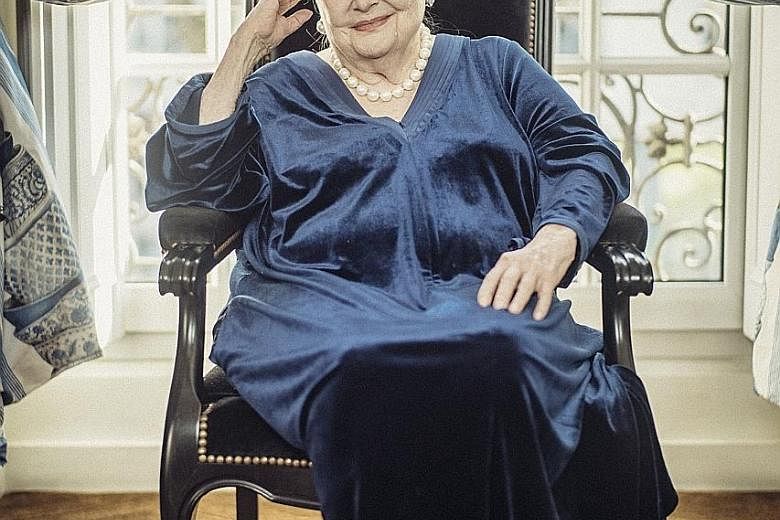PARIS • Who goes to court to defend one's reputation when one is already 101 years old?
E-mailing from a Paris hotel where she lives, two-time best actress Oscar winner Dame Olivia de Havilland said she is, seeking law and order in an entertainment industry that is raiding the past for story lines. The topic at hand is her lawsuit against the FX network and Ryan Murphy Productions over her portrayal by Catherine Zeta-Jones in last year's docu-drama Feud: Bette And Joan - about the rivalry between actresses Bette Davis and Joan Crawford.
On March 20, the California Court of Appeals will hear arguments over whether de Havilland can proceed with her suit, which alleges unauthorised use of her name and likeness to endorse a product - a "right of publicity" claim - as well as libel and defamation.
Few expect her to win, but the action is nonetheless reverberating as a kind of last stand against the current approach to facts.
The recipient of two best actress Oscars for To Each His Own (1946) and The Heiress (1949), de Havilland filed the suit in June, right after Feud aired to critical acclaim and a day before she turned 101.
It was also just a few weeks after the Queen of England bestowed on de Havilland, whose equally famous and estranged sister Joan Fontaine died in 2013, the title of dame for her service to drama.
De Havilland wrote in an e-mail: "When Feud was first being publicised, but before it went on the air, I was interested to see how it would portray my dear friend Bette Davis.
"Then friends and family started getting in touch with me, informing me that my identity was actually being represented on the programme. No one from Fox had contacted me to ask my permission, to request my input or to see how I felt about it.
"When I then learnt that the Olivia de Havilland character called my sister Joan 'a b****' and gossiped about Davis and Crawford's personal and private relationship, I was deeply offended."
The last time she had a case before the California Court of Appeals was in 1944. Risking her career, she sued Warner to get out of her contract, which she signed in 1936.
She had been suspended for refusing parts assigned to her, a common ploy among studio bosses to keep stars in line, with the missed time tacked on to the length of her deal.
She was 28, a brunette ingenue from English stock, raised in what she wryly called "the most aristocratic village in the prune belt" of northern California.
In the 1930s alone, she starred with the swashbuckling Errol Flynn in six films, including The Adventures Of Robin Hood (1938). She was lent out to David O. Selznick for the role that would make her an American treasure: Melanie Wilkes in Gone With The Wind (1939).
She won the court case then, tipping the scales of studio autocracy and strengthening a California labour statute. The so-named De Havilland Law prohibits the enforcement of a personal services contract beyond seven years.
Now, she is hoping for another victory.
"Feud," she claims, as a work of historically convincing fiction, falsely exposes her as a hypocrite - "with a public image of being a lady" and a private one as a vulgarity-using gossip, violating her hard-earned reputation for "honesty, integrity and good manners".
These are qualities that may seem quaint in the age of Twitter.
But the legal action arrives during a content boom that has sent writers raiding recent history sometimes before it has pickled, looking for figures and epochs to refashion as entertainment.
Courts have overwhelmingly supported First Amendment protection for movies and television shows about figures and subjects in the public interest. But de Havilland is undaunted.
"A large part of the reason I decided to move forward with my action against Fox is that I realise that, at this stage of my life and career, I am in a unique position to stand up and speak truth to power - an action that would be very difficult for a young actor to undertake," she wrote. "I believe in the right to free speech, but it certainly must not be abused by using it to protect published falsehoods or to improperly benefit from the use of someone's name and reputation without their consent.
"Fox crossed both of these lines with Feud and if it is allowed to do this without any consequences, then the use of lies about well-known public figures masquerading as the truth will become more and more common. This is not moral and it should not be permitted," de Havilland said of her own public feud.
NYTIMES

